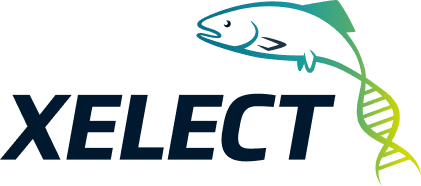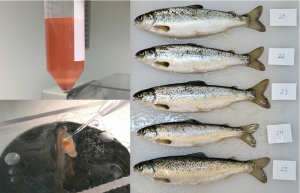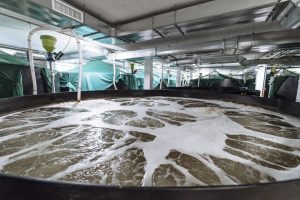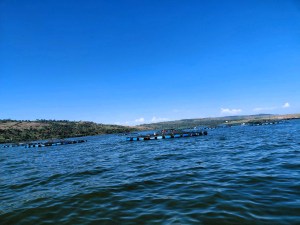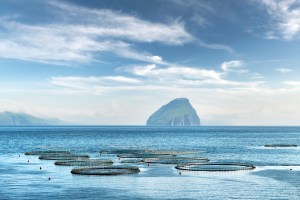On 1 June 2015 a new Horizon 2020 programme, EMBRIC (European Marine Biological Research Infrastructure Cluster), kicks off a series of activities to bring Europe’s ‘blue bioeconomy’ agenda to the fore. Funded with €9 million over the next four years, EMBRIC will connect marine biotechnology initiatives that focus on science, industry and regional development.
Marine biotechnology seeks to unlock the vast economic potential presented by living systems in the world’s oceans. Fragmentation has made it difficult to exploit this potential to its fullest – for example research services that operate in isolation, barriers (practical and cultural) between academic and commercial R&D, and a lack of harmony in regional innovation policies. EMBRIC seeks to overcome these barriers by linking biological and social science research infrastructures throughout Europe, and by joining up aligned efforts in science, industry and regions.
Dr Tom Ashton, of “Xelect Ltd. – Genetic solutions for aquaculture”, commented: “EMBRIC is well placed to build on natural synergies between innovative companies and leading researchers throughout Europe. We expect EMBRIC to create the essential scientific, commercial and social links that Europe needs to deliver substantial economic and scientific gain through marine biotechnology for years to come”.
EMBRIC will put substantial efforts into developing the resources needed for the selective breeding of shellfish and finfish. This part of the work will focus on commercial needs, ensuring their practices and strategic goals are in line with cutting-edge molecular research largely performed outside of companies. Leading companies involved in the project include TUNATECH GmbH in Germany [http://www.tunatech.de/], XELECT Ltd. in Scotland [http://www.xelect.co.uk] and SCALPRO in Norway. They will collaborate with the University of St Andrews in Scotland, INRA in France, Marine Science Scotland, the Hellenic Centre for Marine Research, in Greece and the European Bioinformatics Institute (EMBL-EBI, www.ebi.ac.uk), located in the United Kingdom.
European shellfish production has shown low growth (~4% increase/year) relative to other parts of the world. To transform Europe’s growth prospects in this sector, companies need to develop and implement ‘biosecure’ hatcheries as well as selective breeding to improve disease resistance, tolerance to environmental stresses and growth.
A key task for EMBRIC will be to develop protocols for assessing the most commercially important traits of growth, yield and disease resistance, and this will be done using King scallop (Pecten maximus) from cultivation sites in Norway and Scotland as a model species. The partners will also develop methodologies for ‘disease-challenge trials’ to establish this organism’s susceptibility and resistance to Vibrio spp. and other pathogens traditionally associated with death in shellfish.
EMBRIC will evaluate methods to assess import traits for selection in finfish, including feed-conversion efficiency (European seabass, Dicentrarchus labrax), parasite resistance (Atlantic salmon, Salmo salar), flesh texture and fat content (Atlantic Bluefin tuna, Thunnus thynnus), and growth rates (larval and fingerling of greater amberjack, Seriola dumerili).
Global aquaculture production has yet to benefit from any form of genetic improvement, but technologies have improved so dramatically in recent years that this is set to change. Next-generation DNA sequencing technologies have fallen in price dramatically, stimulating research and leading to a raft of relevant genome sequences available to study many shellfish and finfish of commercial importance. This has already resulted in new genetic tools for stock management that are used in family-selection programs, and the adoption of marker-assisted selection for disease resistance and increased meat yield in Atlantic salmon.
EMBRIC will conduct a comprehensive survey of the genetic resources available for selective breeding and develop industry standards and new pipelines for genetic marker discovery in order to ensure that industry benefits from the latest research.
By enabling researchers to involve industry from the beginning of the experimental process, EMBRIC will accelerate translation by allowing companies to integrate results and protocols directly into commercial processes. The EMBRIC “Company Forum” will be open to anyone working in aquaculture, providing a platform for sharing and discussing results and fostering interaction amongst diverse stakeholders.
EMBRIC resource development is coordinated by Professor Ian Johnston (iaj@st-andrews.ac.uk) of the School of Biology, University of St Andrews in Scotland, UK. The Company Forum will be led by Professor Chris Bridges (bridges@hhu.de) of TUNATECH in Germany.
About EMBRIC
EMBRIC is coordinated by the ESFRI Research Infrastructure EMBRC – European Marine Biological Resource Centre (EMBRC), which brings together excellent and unique marine biology research facilities from France, Italy, Portugal, Belgium, Spain, Greece, Israel, Norway and the UK. EMBRC headquarters is situated in central Paris at the Jussieu Campus of the University of Pierre & Marie Curie (UPMC). The project is coordinated by Professor Bernard Kloareg (UPMC, Roscoff).
For further information about the selective breeding in aquaculture work package of EMBRIC or the proposed Company Forum, contact: Ian Johnston 44-1334-463440 or Christopher Bridges +491739531905
